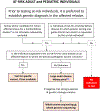Advancing Genetic Testing in Kidney Diseases: Report From a National Kidney Foundation Working Group
- PMID: 39033956
- PMCID: PMC11585423
- DOI: 10.1053/j.ajkd.2024.05.010
Advancing Genetic Testing in Kidney Diseases: Report From a National Kidney Foundation Working Group
Abstract
About 37 million people in the United States have chronic kidney disease, a disease that encompasses multiple causes. About 10% or more of kidney diseases in adults and as many as 70% of selected chronic kidney diseases in children are expected to be explained by genetic causes. Despite the advances in genetic testing and an increasing understanding of the genetic bases of certain kidney diseases, genetic testing in nephrology lags behind other medical fields. More understanding of the benefits and logistics of genetic testing is needed to advance the implementation of genetic testing in chronic kidney diseases. Accordingly, the National Kidney Foundation convened a Working Group of experts with diverse expertise in genetics, nephrology, and allied fields to develop recommendations for genetic testing for monogenic disorders and to identify genetic risk factors for oligogenic and polygenic causes of kidney diseases. Algorithms for clinical decision making on genetic testing and a road map for advancing genetic testing in kidney diseases were generated. An important aspect of this initiative was the use of a modified Delphi process to reach group consensus on the recommendations. The recommendations and resources described herein provide support to nephrologists and allied health professionals to advance the use of genetic testing for diagnosis and screening of kidney diseases.
Keywords: Delphi; disclosing test results; genetic counselor; genetic testing; kidney disease; modality; monogenic; patient perspective; transplant.
Copyright © 2024. Published by Elsevier Inc.
Figures




References
Publication types
MeSH terms
Grants and funding
LinkOut - more resources
Full Text Sources
Medical

